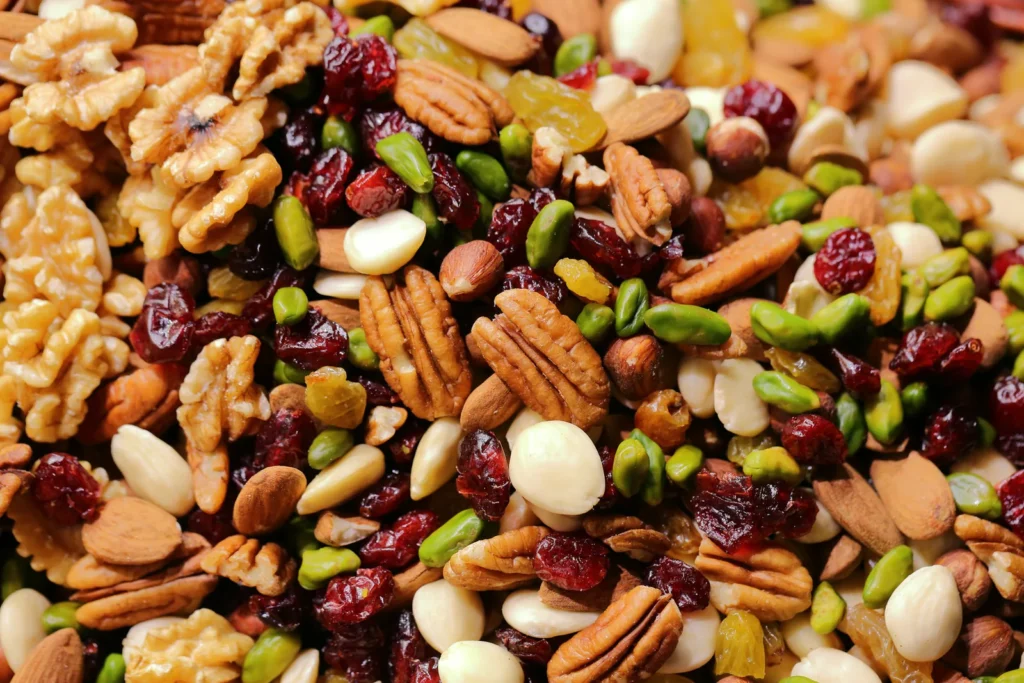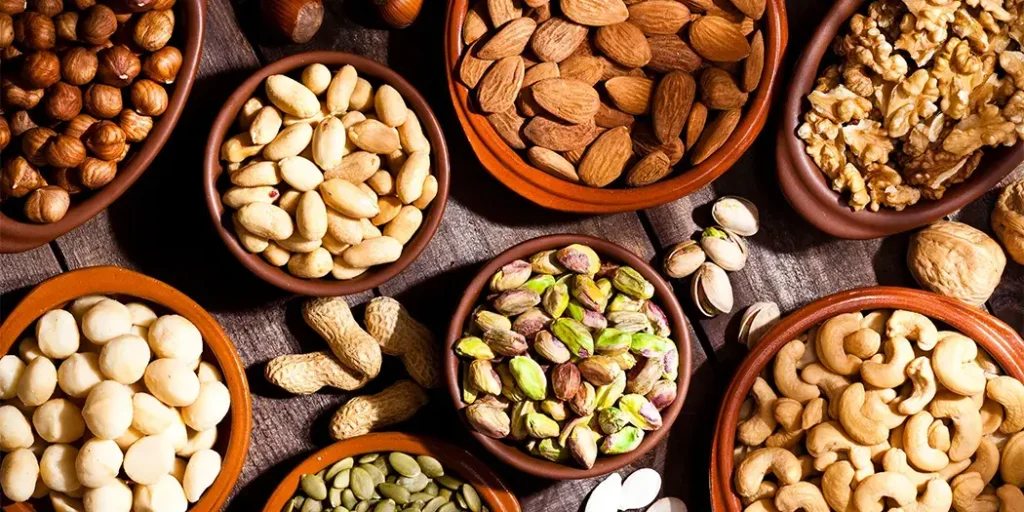Nuts have been a staple in human diets for thousands of years, prized for their rich flavor, versatility, and impressive nutritional profile. From almonds and walnuts to cashews and pistachios, these tiny powerhouses are packed with nutrients that offer a myriad of health benefits. In this detailed article, we’ll explore why deserve a permanent spot in your daily diet, how they support overall wellness, and practical tips to incorporate them into meals. Whether you’re a health enthusiast or simply curious, this guide will show you why are more than just a snack—they’re a superfood.
PLANTERS Deluxe Mixed Nuts, Cashews, Almonds, Pecans, Pistachios, Hazelnuts, Roasted with Sea Salt, Party Snacks, Plant-Based Protein Nut Mix, Snacks for Adults, After School Snack Mix, 27oz
1. Nutritional Profile of : A Treasure Trove of Nutrients
Nuts are nature’s multivitamins. They’re loaded with essential nutrients, including healthy fats, protein, fiber, vitamins, and minerals. Here’s a breakdown of what makes nuts so special:
- Healthy Fats: Most are rich in monounsaturated and polyunsaturated fats, which support heart health. For example, walnuts are high in omega-3 fatty acids, while almonds provide ample monounsaturated fats.
- Protein: Nuts are an excellent plant-based protein source, making them ideal for vegetarians and vegans. A handful of peanuts, for instance, contains about 7 grams of protein.
- Fiber: The high fiber content in aids digestion and promotes satiety. Pistachios and almonds are particularly fiber-rich.
- Vitamins and Minerals: Nuts are packed with vitamin E, magnesium, selenium, and B vitamins, all of which play critical roles in bodily functions.
This nutrient density makes a smart choice for anyone looking to boost their overall health.
2. Heart Health: How Nuts Protect Your Cardiovascular System
One of the most well-researched benefits of eating is their positive impact on heart health. Studies consistently show that regular consumption of lowers the risk of heart disease by:
- Reducing LDL Cholesterol: The healthy fats in help lower “bad” LDL cholesterol levels, a major risk factor for heart disease.
- Improving Blood Vessel Function: Compounds like arginine in promote nitric oxide production, which relaxes blood vessels and improves circulation.
- Lowering Inflammation: Antioxidants in, such as polyphenols, combat inflammation linked to atherosclerosis.
A landmark study published in The New England Journal of Medicine found that people who ate daily had a 20% lower risk of dying from heart disease. Walnuts, almonds, and hazelnuts are particularly effective due to their unique nutrient combinations.

3. Weight Management: Nuts as a Satiety Superstar
Contrary to the myth that cause weight gain, they can actually aid in weight management. Here’s how:
- High Fiber and Protein: These nutrients keep you full longer, reducing cravings and overeating.
- Healthy Fats: The fats in are slowly digested, prolonging satiety.
- Thermic Effect: Your body burns more calories digesting compared to processed snacks.
Research in The Journal of Nutrition revealed that individuals who included in their diet had better weight control over time. Just remember to stick to moderate portions (about 1 ounce daily) to avoid excess calorie intak
4. Brain Boost: Nuts for Cognitive Function
Your brain thrives on the nutrients found in . Omega-3 fatty acids in walnuts, antioxidants in pecans, and vitamin E in almonds all contribute to:
- Enhanced Memory: Studies link consumption to improved cognitive performance in older adults.
- Reduced Risk of Neurodegenerative Diseases: The anti-inflammatory properties of may protect against Alzheimer’s and Parkinson’s.
- Mood Regulation: Magnesium in cashews and Brazil helps combat stress and anxiety.
A 2020 study in Advances in Nutrition found that adults who ate daily scored higher on cognitive tests than those who didn’t.
5. Diabetes Prevention and Blood Sugar Control
Nuts are a diabetic-friendly food due to their low glycemic index and high magnesium content, which improves insulin sensitivity. Key benefits include:
- Stabilized Blood Sugar: The fiber and healthy fats in slow glucose absorption.
- Reduced Insulin Resistance: Regular consumption is associated with a 30% lower risk of type 2 diabetes.
Almonds and pistachios have shown particularly strong effects in clinical trials for improving blood sugar levels.

6. Digestive Health: Fiber and Prebiotics in Nuts
The fiber in isn’t just good for weight loss—it’s essential for gut health. Many, like pistachios and cashews, contain prebiotics that feed beneficial gut bacteria. A healthy gut microbiome is linked to:
- Improved digestion
- Stronger immunity
- Reduced risk of colon cancer
7. Anti-Aging Properties: Nuts for Youthful Skin and Longevity
Nuts are rich in antioxidants like vitamin E, selenium, and polyphenols, which fight free radicals responsible for aging. Regular consumption can:
- Reduce wrinkles and improve skin elasticity
- Protect against UV damage
- Slow cellular aging
A diet rich in has even been linked to longer telomeres—a biomarker of longevity.
8. Immune System Support
The zinc in cashews, selenium in Brazil, and vitamin E in almonds strengthen the immune system. These nutrients enhance white blood cell function and antibody production, helping your body fend off infections.

9. Bone Health: Minerals for Stronger Skeletal Structure
Nuts provide calcium, magnesium, and phosphorus—key minerals for maintaining bone density. For example, almonds contain 76 mg of calcium per ounce, making them a great option for those avoiding dairy.
10. Cancer Prevention Potential
Emerging research suggests that compounds in , such as ellagic acid (found in walnuts) and phytosterols, may inhibit cancer cell growth. While more studies are needed, the antioxidant and anti-inflammatory properties of are promising.
11. Energy Boost: Nuts as a Natural Fuel Source
The combination of healthy fats, protein, and complex carbs in provides sustained energy, making them a perfect pre-workout snack or midday pick-me-up.
12. Skin Health: Glowing Skin from Within
Vitamin E in protects skin cells from oxidative damage, while omega-3s reduce acne and inflammation. Snacking on can lead to a clearer, more radiant complexion.

How to Incorporate More Nuts Into Your Diet
- Add chopped to oatmeal, yogurt, or salads.
- Use nut butters as a spread or in smoothies.
- Opt for raw or dry-roasted to avoid added oils and salt.
- Practice portion control (1 oz = a small handful).
Frequently Asked Questions About Nuts
Q: Can eating too many nuts be harmful?
A: While are healthy, overconsumption can lead to weight gain due to their calorie density. Stick to recommended portions.
Q: Are nuts safe for people with nut allergies?
A: No—those with allergies should avoid consult a doctor for alternatives.
Q: Which nut is the healthiest?
A: All offer unique benefits, but walnuts and almonds are often highlighted for their exceptional nutrient profiles.
Conclusion: Embrace the Power of Nuts
From heart health to glowing skin, the benefits of eating are vast and scientifically backed. These nutrient-dense foods are a simple, delicious way to enhance your diet and protect your long-term health. By incorporating a variety of into your meals, you’ll unlock their full potential and enjoy a happier, healthier life. So, grab a handful of nuts today—it’s a small step with big rewards!
